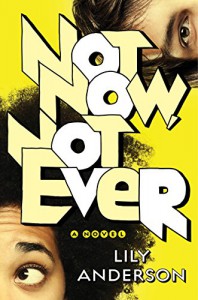For lovers of clever and witty dialogue, geeks, sci-fi, popular culture and Oscar Wilde. A great YA story.

I read and reviewed Lily Anderson’s first book The Only Thing Worse than Me Is You (you can check my review here) last year. I loved it and I mentioned that I would be watching out for more of the author’s books. When a publicist from St. Martin’s Press got in touch with me offering me to take part in the blog tour for the author’s next book, I had to check it out. When I read that this time the author’s inspiration was Oscar Wilde’s The Importance of Being Earnest I knew I’d fight tooth-and-nail to take part if necessary. Thankfully, it didn’t come to that, but it would have been worth it.
Elliot/Ever (if you know Wilde’s play, you’ll know that there are several people using false identities for a variety of reasons, mostly to live a different kind of life away from prying eyes) is a seventeen year old African-American girl, who lives in California, with a somewhat complicated family background (the Lawrence, on her mother’s side, have a long tradition of joining the Air Force, and her mother, in fact, teaches at the Air Force Academy in Colorado Springs, while she lives with her father, a lawyer of French descent. Her step-Mom, Beth, is an estate agent, white, and an amateur actress, and she has a half-brother, Ethan). Her mother and all of her mother’s family expect her to join the Air Force, while her father wants her to do anything but that (mostly go to College somewhere nearby). And Elliot… Well, she wants to study Science-Fiction Literature. She is a geek. Her step-mother is about to play Gwendoline for the sixth time in an amateur production of The Importance of Being Earnest (that Elliot knows by heart from so many performances and rehearsals) and she decides to take control of her life and avoid another farcical summer. She lies to everybody around her, creates a fake identity (inspired by Wilde’s play), and after passing a genius exam to enter a summer programme (to win a fantastic scholarship to the college of her dreams, mostly because they have an amazing sci-fi collection in the library and they offer a degree in Science-Fiction Literature) she sets off to Oregon, determined to win no matter what.
Elliot/Ever soon discovers that you cannot outrun Wilde and that there’s nothing more farcical than a camp for geniuses. She has a few surprises (she’s not the only one to use a fake identity or lie), meets wonderful people (and some not quite so wonderful), finds love, and discovers what’s really important.
Like in Anderson’s previous novel, we have a first-person narration, this time by Elliot, who is a clever, witty, and determined girl. In this case she was not aware she was a genius (another member of the family was always considered the clever one), but the summer camp is not that dissimilar to the high school in the previous novel, although in this case everybody, apart from the college students who facilitate the camp, are new to the place, they don’t know each other and are thrown together in pretty stressful circumstances. We have, again, many pop culture and bigger Culture references (some, I must admit went over my head, but I didn’t mind that), a diverse group of students, but all clever, studious, dedicated, nerdy, and quirky. I loved Leigh, Elliot’s roommate, Brandon (a guy who carries a typewriter around. Come on, I’m a writer too. Who would not love him), and most of the characters. The dialogue sparkles and the quotes from Wilde’s play, that keep popping up into Elliot’s head, are sometimes humorous (I particularly like the ‘A tree!’ ‘A handbag!’ comparison) but sometimes the author chooses quotes that reflect the serious matters at hand. Although at first, it seems the furthest possible setting for such a play, the summer camp works well, as we have many restrictions, a lockdown, rules that can be broken and people hiding secrets, overhearing things they shouldn’t, and getting into all kinds of problems.
There is cheating, friendships, betrayals, bizarre but vividly portrayed contests (Star Wars based fights to the death, The Breakfast Club themed memory tests…) and young romance.
I don’t know if it was because of the build-up and the identity changes but it took me a bit longer to get into the story than it did the previous novel, but once at the camp and when I got used to Elliot/Ever’s voice and her accurate descriptions of people and things, I felt as if I was there and could not put the book down.
The ending… Well, you’ll have to read it. It’s probably not what you expect but it’s good.
Once again I’ve highlighted many bits. A few random ones:
And he was wearing loafers. I couldn’t get my swoon on for a guy who didn’t wear socks.
Two narrow pressboard wardrobes that were less Narnia, more IKEA.
She sounded as though she really meant it, but that could have been because everything she said sounded vaguely like it was licensed by Disney.
He was cute and presumably very smart and, unlike so many other white dudes, he’d never told me how much hip-hop meant to him like my melanin made me a rap ambassador.
Another great YA novel that I’d recommend to people who enjoy sci-fi and pop culture references, people who love books and libraries, and who appreciate young female characters that have interests beyond school balls and boyfriends. And of course, if you love witty dialogue, farcical plots, and are a fan of Oscar Wilde, you are in for a treat. I’ll for sure be waiting for Anderson’s next novel.
Thanks to Wednesday Books (St. Martin’s Press) and to NetGalley for providing me an ARC copy of the novel that I freely chose to review.







